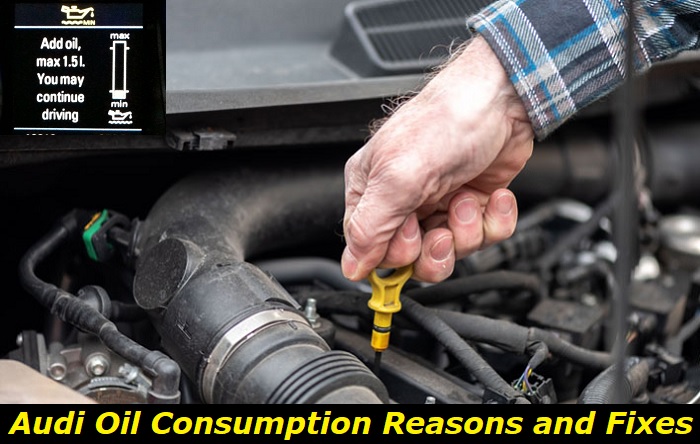Audi is a German luxury brand renowned for its performance, masterfully-designed interiors, and iconic Quattro all-wheel-drive system. Its combination of technology and flair is what gives the brand a strong presence in the luxury vehicle segment of the market. Almost every model has a premium cabin and is a reliable performer.
Oil consumption highlights
- Level of urgency:high
- Average mileage:over 100,000 miles
- Repair cost:$900 - $3,500
- DIY repair:possible but extremely complicated
- Commonreasons:worn-out valve seals, piston rings, internal engine problems, turbocharger problems
- If ignored:fatal engine damage, catalytic converter contamination, EGR system contamination
- How to solve:replace the worn-out parts, inspect the engine for oil consumptionreasons

Immediate Signs
Too much oil consumption is a problem that you should repair right away. This can cause all sorts of problems, from engine damage to poor fuel economy.
Oil leaks are the primary culprits for this, which can manifest in many ways. The most obvious is a puddle of oil beneath your car. You might also see oil on the ground where you have parked your car, or on the driveway if you have an attached garage. If you see oil on your tires, it's likely that the leak is coming from your engine.
Another red flag is when you just filled your reservoir with a fresh batch of oil, but after a while, the level appears to be draining low once more. This could be due to an oil leak, however, it may relate to another problem, too. It's possible that your car is burning through oil too quickly as well. If it's the latter, you'll likely see blue smoke coming from your exhaust pipe.
If you notice any of these immediate signs, it's important to take your car to a mechanic without delay. They can diagnose the problem and get it fixed before it causes any serious damage.
Audi Models Prone to Oil Consumption Problems
It should be noted that not all Audi vehicles are experiencing these. Most complaints relating to this issue come from Audi 2.0 TFSI and 1.8 TFSI engine users though. According to reports and customer feedbacks, the early TFSI gasoline engines used by the brand sometime between 2008 and 2012 in the A5, A4, and Q5 have a design flaw that can be blamed for excessive oil consumption.
Solutions to the Oil Consumption Problems in Audi Cars
The excessive oil consumption in specific Audi models, especially those equipped with the first-generation TFSI engines, is commonly blamed on the design of their power units. With that, here are the common factors that are contributing to the issue:
1. Leak Around the Piston Rings
Based on people familiar with the problem, the primary catalyst for it seems to be the piston rings, which enable oil to trickle around the pistons into the cylinders where it ignites and causes high oil consumption.
The usual way some Audi users become conscious of this is when the "add one liter of oil" message pops out on the dashboard. This notice doesn't necessitate stopping the vehicle right away, instead, it means you should add a liter of correct grade oil as soon as possible.
This problem only worsens over time as it becomes a more recurring matter. As a result, the distance you'll be able to travel without needing more oil gradually decreases. In severe cases, there might be visible smoke emerging from the exhaust when accelerating hard and the overall quality of your emission becomes poorer over time.
The failure to address the issue in a timely manner will eventually have a direct impact on the engine cylinders. The immediate effect is scoring in their bores. The more grooves are made and the deeper they get, the more oil tends to seep through them as they bypass the piston rings, thus, worsening the issue bit by bit.
There are a few potential solutions to this problem. If your vehicle has more than 100,000 miles on it, the engine might need to be rebuilt or replaced as the piston rings may be too worn by then and the other interior components of the power unit have already taken a heavy toll from the issue.
On the other hand, if your auto is still under warranty, only the ring package might be replaced, which usually fixes the issue. If not, then a new set of piston rings can simply be installed.
2. Bore Scoring
Since there is a cluster of parts affected by the function of the piston rings, the failure to fix the issue right out of the box will lead to more problems. One of the direct impacts of leaky piston rings is bore scoring.
Bore scoring is the wear and tear on the cylinder wall due to the piston rings not sealing correctly. When this happens, exhaust gases and engine oil will start to seep through into the cylinders. This will lead to a decrease in performance as well as an increase in fuel consumption. In more extreme cases, it could also cause engine seizure due to excessive friction.
There are several ways you can tell if your Audi engine is starting to experience bore scoring. One of the most obvious signs is the loss of power when accelerating. In addition, you'll notice an increase in fuel consumption and your engine will start to run louder than usual.
When bore scoring is detected early on, there are things you can do to fix the problem. The first thing to do is replace the piston ring that is causing it. Next, you will have to get the cylinder wall machined in order to get rid of the scoring. However, if the damage is too severe, then you'll most likely need to rebuild or replace the entire engine. The latter is a costly repair, so it's important to catch bore scoring early on.
There are several ways to prevent bore scoring in your Audi engine. First, make sure that you're using the correct grade of oil. Second, don't forget to change your oil regularly. Third, avoid running your engine at high rpm for extended periods of time. Fourth, have your piston rings checked regularly for possible leaks. By following these simple tips, you can avert a potential disaster in your Audi engine.
3. Cracked Cylinders
Ignoring the leaks in the piston rings can lead to a series of unfortunate events for your engine. Further procrastinating after it has already resulted in bore scoring can lead to cracks in the cylinders. Cylinder cracks are a big problem because they can cause extensive damage to your engine, and often require an entire engine replacement.
When an engine is operating, the piston rings seal the gap between the piston and the cylinder wall. This ensures that the burning fuel mixture stays in the combustion chamber where it can be properly utilized. If there are any leaks in the piston rings, it will allow some of that mixture to escape. In addition, this will also cause oil to enter the chamber and mix with the fuel. The oil will make the mixture less combustible, which will reduce your engine's power output.
If you notice any loss of power or decreased fuel economy, it is likely that you have a leak in your piston rings. You should have your engine checked as soon as possible to avoid any further damage.
Cylinder cracks can occur for a number of reasons. For Audis with the oil consumption issues, these can likely be traced back to overheating due to the improper lubrication brought about by the piston ring leaks. When an engine overheats, the metal expands and puts stress on the cylinder walls.
This can eventually lead to cracks. Another common cause is using lower quality fuel than what is recommended for your car. Moreover, this can cause deposits to build up on the cylinder walls, which can eventually lead to cracking.
If you notice any of the symptoms of cylinder cracks, it is important to have your engine repaired immediately. Continuing to drive with damaged cylinders can cause even more damage and may eventually result in an engine replacement.
There are different ways that cylinder cracks can be repaired, but it is often best to simply replace the affected cylinders. This will ensure that your engine is operating properly and will help avoid any further damage.
Audi engines are known for their high performance and reliability. However, the ones prone to excessive oil consumption are susceptible to cylinder cracks, too. Cylinder cracks can occur for a number of reasons, but the most common cause is overheating. If you notice any of the symptoms of cylinder cracks, it is important to have your engine checked immediately to avoid any further damage.
Replacing the affected cylinders is often the best way to repair the problem and guarantee that your engine is operating properly.
Conclusion
The main suspect for the excessive oil consumption problem in a significant number of Audi cars is the engineering of their piston rings, which are prone to leakage, and the negative effect of this can easily spread out to the other components of the engine.
Therefore, it is important that all the factors in play should be taken care of in a timely manner. No matter what the cause, it's always important to consult an Audi mechanic to ensure the quick resolution of the problem.
About the authors
The CarAraC research team is composed of seasoned auto mechanics and automotive industry professionals, including individuals with advanced degrees and certifications in their field. Our team members boast prestigious credentials, reflecting their extensive knowledge and skills. These qualifications include: IMI: Institute of the Motor Industry, ASE-Certified Master Automobile Technicians; Coventry University, Graduate of MA in Automotive Journalism; Politecnico di Torino, Italy, MS Automotive Engineering; Ss. Cyril and Methodius University in Skopje, Mechanical University in Skopje; TOC Automotive College; DHA Suffa University, Department of Mechanical Engineering






Add comment